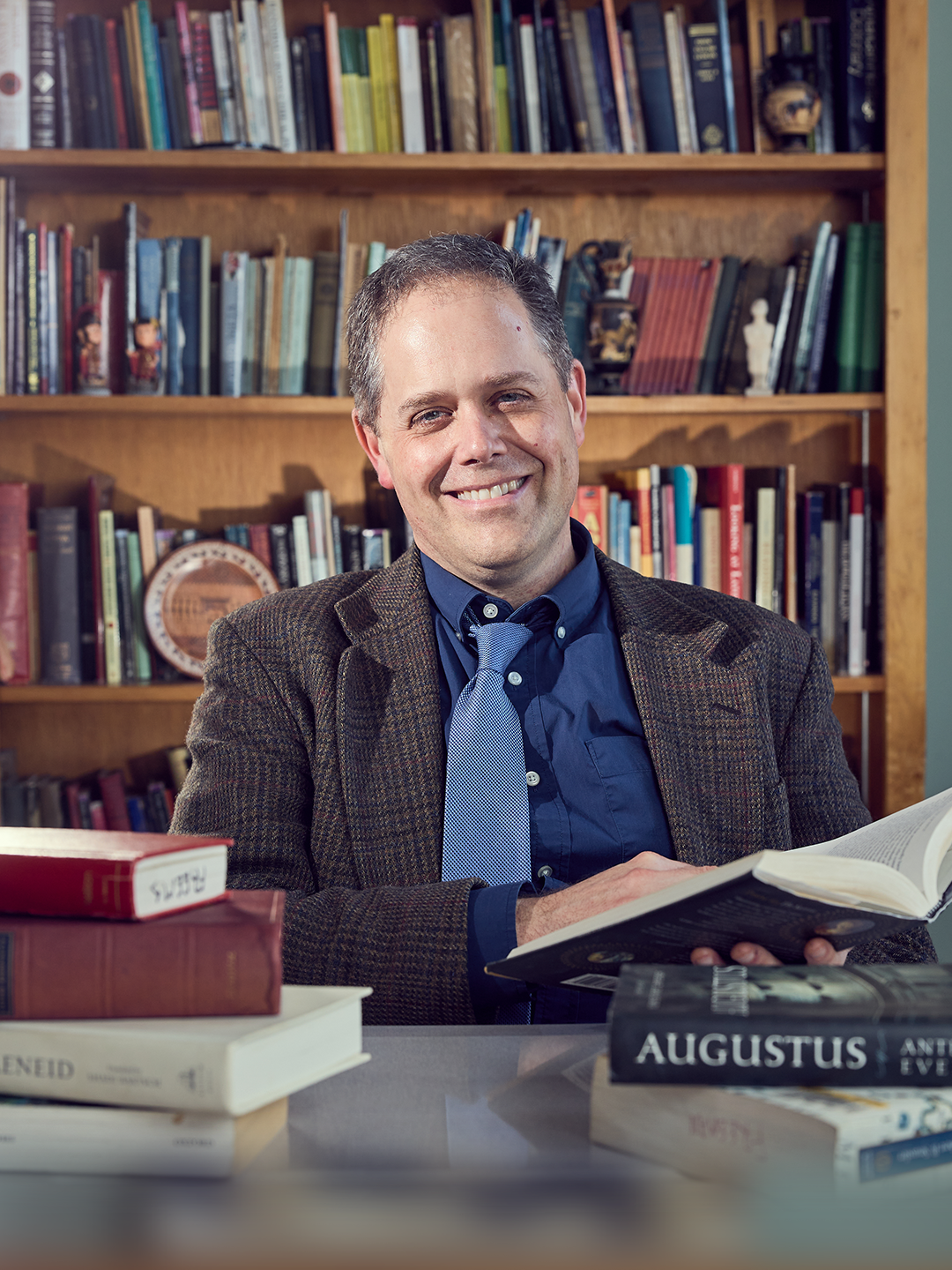- About
- Why ‘Town
- Admission
- Lower School
- Middle School
- Upper School
- Summer Programs
- Academic Calendar
- Athletics
- Arts
- MyWesttown
- Photos
- Support Westtown
- Alums

With closed eyes and outstretched arms, he paces as he describes an epistle from Pliny to Tacitus for students, his joy and enthusiasm palpable and contagious. Ted Freeman wears his passion for Latin on his blazered sleeves, but it is one that is not loud nor performative; it is as deep and genuine as his care for his students, his colleagues, and this community.
Freeman has filled numerous roles in his 22 years (so far) at Westtown—teacher, international trip leader, tennis coach, dorm head, faculty clerk, and class dean— and in each he has made an enduring impact, bringing to bear his quiet wisdom, devotion to the community, and, of course, his signature dry humor.
Freeman has a gift for bringing Latin and the classics to life for students, for helping them appreciate the significance of them in history, politics, and the human condition. “[Ted] made the subject of Latin so much more than just the language—it was a lens through which to think about culture (ancient and modern), philosophy, identity, and politics,” says Ainsley Bruton ’17. “We were able to apply what we were learning to our own lived experiences in meaningful ways.” Francis Miller ’09 agrees. “His undying passion brought Latin alive for us. The unique combination of ancient philosophy, Roman badassery, raunchy poetry, and Ted’s unique sense of humor meant we looked forward to Latin every day.” Latin and classical literature are scholarly subjects, and Freeman is adept at making them accessible to students as well as inspiring kindred passions. Julia Richards ’16, who went on to major in the Classics, says, “Latin is so much more than just a language—there are the cultural/political implications, the history, and the mythology—and without Ted taking the time to explore that in class, Latin would have been one dimensional.”
Freeman’s colleagues view him as a superlative teacher and leader with gravitas, one who is also humble. So it’s no surprise when Freeman describes the role humility plays in his teaching. “Countless myths warn humanity of the dangers of hubris. I hope to capture the enlightenment of intellectualism, but equally important is the wisdom gained through humility,” he reflects. “I think what most drives my love of teaching Latin is finding that path between intellectualism and humility and leading my students on it.”
Freeman develops meaningful relationships with students that extend far beyond the classroom. His students, past and present, say he is deeply invested in their wellbeing and their regard for Freeman is apparent. One describes that throughout the pandemic, Freeman would Zoom with him and his sister weekly to play Latin Scrabble, a comforting, fun activity during an uncertain time. Bruce Mao ’22 shares, “As an advisor and one of the adults with whom I’ve had many thorough conversations, he has been a blessing and a gift to me. He is always patient and responsible. He is the person I rely on the most.” Jake Richards ’22 sums it up well: “[He] is the kind of man who understands the power of language in its capacity for engendering action and…weighs his advice with a sense of great forethought.”
When colleagues describe Freeman, they note his ability to make those around him and his students feel seen and heard, to challenge them intellectually. “Ted has a wealth of institutional memory and experience that make him an incredible educator,” says Mauricio Torres ’08. “He has a way of ‘talking up’ to students—he treats them like the adults they’re striving to be.” Ellen Abbott, English Department Chair, shares, “He loves these kids and connects with them. He really wants to know their stories and they feel it.” Fellow Latin teacher LJ Scurfield adds, “Ted pushes his students to stretch their minds, to dig deep and pull from that hidden truth lying beneath the surface.”
“Westtown has shaped me in profound ways—as an educator, colleague, and leader,” shares Freeman. I’ve built countless relationships with students, friends, and colleagues, and each of them inform who I am.” And his students, colleagues, and the school have been profoundly shaped by him. He is, indeed, sui generis.
From the 2023/Volume 1 issue of The Westonian